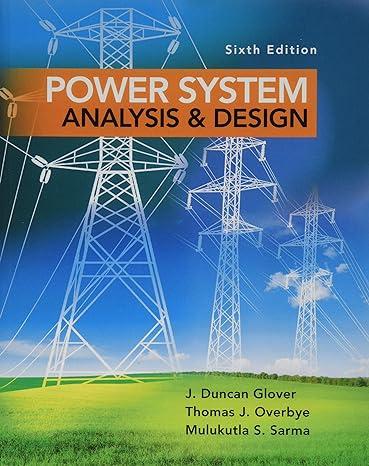Given two generating units with their respective variable operating costs as [ begin{array}{ll} mathrm{C}_{1}=0.01 mathrm{P}_{mathrm{G} 1}^{2}+2 mathrm{P}_{mathrm{G}
Question:
Given two generating units with their respective variable operating costs as
\[
\begin{array}{ll}
\mathrm{C}_{1}=0.01 \mathrm{P}_{\mathrm{G} 1}^{2}+2 \mathrm{P}_{\mathrm{G} 1}+100 \$ / \mathrm{hr} & \text { for } 25 \leq \mathrm{P}_{\mathrm{G} 1} \leq 150 \mathrm{MW} \\
\mathrm{C}_{2}=0.004 \mathrm{P}_{\mathrm{G} 2}^{2}+2.6 \mathrm{P}_{\mathrm{G} 2}+80 \$ / \mathrm{hr} & \text { for } 30 \leq \mathrm{P}_{\mathrm{G} 2} \leq 200 \mathrm{MW}
\end{array}
\]
determine the economically optimum division of generation for \(55 \leq\) \(\mathrm{P}_{\mathrm{L}} \leq 350 \mathrm{MW}\). In particular, for \(\mathrm{P}_{\mathrm{L}}=282 \mathrm{MW}\), compute \(\mathrm{P}_{\mathrm{G} 1}\) and \(\mathrm{P}_{\mathrm{G} 2}\). Neglect transmission losses.
Step by Step Answer:

Power System Analysis And Design
ISBN: 9781305632134
6th Edition
Authors: J. Duncan Glover, Thomas Overbye, Mulukutla S. Sarma





